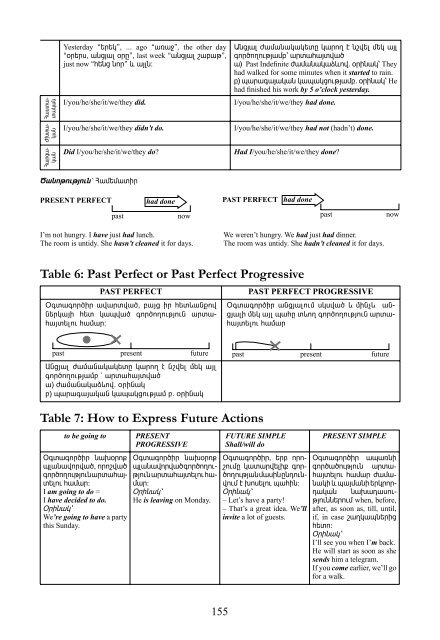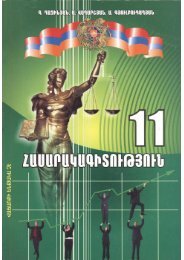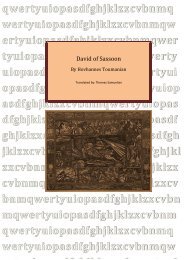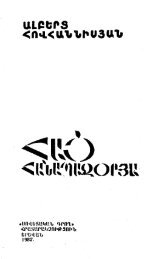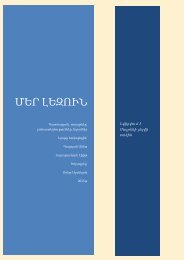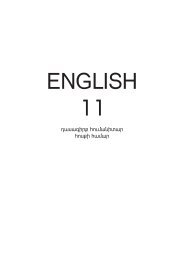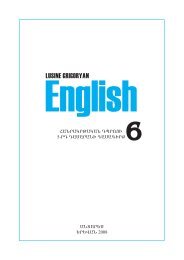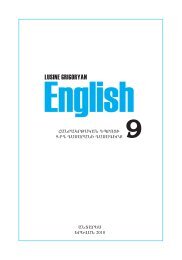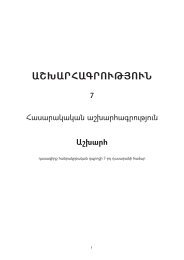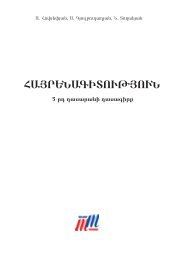Focus on Words
Focus on Words
Focus on Words
You also want an ePaper? Increase the reach of your titles
YUMPU automatically turns print PDFs into web optimized ePapers that Google loves.
Yesterday “երեկ”, ... ago “առաջ”, the other day<br />
“օրերս, անցյալ օրը”, last week “անցյալ շաբաթ”,<br />
just now “հենց նոր” և այլն։<br />
I/you/he/she/it/we/they did.<br />
Անցյալ ժամանակակետը կարող է նշվել մեկ այլ<br />
գործողությամբ` արտահայտված<br />
ա) Past Indefinite ժամանակաձևով. օրինակ՝ They<br />
had walked for some minutes when it started to rain.<br />
բ) պարագայական կապակցությամբ. օրինակ՝ He<br />
had finished his work by 5 o’clock yesterday.<br />
I/you/he/she/it/we/they had d<strong>on</strong>e.<br />
Հաստատական<br />
Ժխտական<br />
Հարցական<br />
I/you/he/she/it/we/they didn’t do.<br />
Did I/you/he/she/it/we/they do?<br />
I/you/he/she/it/we/they had not (hadn’t) d<strong>on</strong>e.<br />
Had I/you/he/she/it/we/they d<strong>on</strong>e?<br />
Ծանոթություն` Համեմատիր<br />
PRESENT PERFECT<br />
had d<strong>on</strong>e<br />
PAST PERFECT<br />
had d<strong>on</strong>e<br />
past<br />
now<br />
past<br />
now<br />
I’m not hungry. I have just had lunch.<br />
The room is untidy. She hasn’t cleaned it for days.<br />
We weren’t hungry. We had just had dinner.<br />
The room was untidy. She hadn’t cleaned it for days.<br />
Table 6: Past Perfect or Past Perfect Progressive<br />
PAST PERFECT<br />
ú·ï³·áñÍÇñ ³í³ñïí³Í, µ³Ûó Çñ ѻ勉Ýùáí<br />
Ý»ñϳÛÇ Ñ»ï ϳåí³Í ·áñÍáÕáõÃÛáõÝ ³ñï³-<br />
ѳÛï»Éáõ ѳٳñ:<br />
PAST PERFECT PROGRESSIVE<br />
ú·ï³·áñÍÇñ ³ÝóÛ³ÉáõÙ ëÏëí³Í ¨ ÙÇÝ㨠³Ý -<br />
óÛ³ ÉÇ Ù»Ï ³ÛÉ å³ÑÁ ï¨áÕ ·áñÍáÕáõÃÛáõÝ ³ñï³-<br />
ѳÛï»Éáõ ѳٳñ<br />
past present future<br />
²ÝóÛ³É Å³Ù³Ý³Ï³Ï»ïÁ ϳñáÕ ¿ Ýßí»É Ù»Ï ³ÛÉ<br />
·áñÍáÕáõÃÛ³Ùµ ` ³ñï³Ñ³Ûïí³Í<br />
³) ųٳݳϳӨáí. ûñÇݳÏ<br />
µ) å³ñ³·³Û³Ï³Ý ϳå³ÏóáõÃÛ³Ù µ. ûñÇݳÏ<br />
past present future<br />
Table 7: How to Express Future Acti<strong>on</strong>s<br />
to be going to<br />
Օգտագործիր նախօրոք<br />
պլանավորված, որոշված<br />
գործողություն արտահայտելու<br />
համար:<br />
I am going to do =<br />
I have decided to do.<br />
Օրինակ՝<br />
We’re going to have a party<br />
this Sunday.<br />
PRESENT<br />
PROGRESSIVE<br />
Օգտագործիր նախօրոք<br />
պլանավորված գործողություն<br />
արտահայտելու համար:<br />
Օրինակ՝<br />
He is leaving <strong>on</strong> M<strong>on</strong>day.<br />
FUTURE SIMPLE<br />
Shall/will do<br />
Օգտագործիր, երբ որոշումը<br />
կատարվելիք գործողության<br />
մասին ընդունվում<br />
է խոսելու պահին:<br />
Օրինակ՝<br />
– Let’s have a party!<br />
– That’s a great idea. We’ll<br />
invite a lot of guests.<br />
PRESENT SIMPLE<br />
Օգտագործիր ապառնի<br />
գործածություն արտահայտելու<br />
համար ժամանակի<br />
և պայմանի երկրորդական<br />
նախադասություն<br />
ներում when, before,<br />
after, as so<strong>on</strong> as, till, until,<br />
if, in case շաղկապներից<br />
հետո:<br />
Օրինակ՝<br />
I’ll see you when I’m back.<br />
He will start as so<strong>on</strong> as she<br />
sends him a telegram.<br />
If you come earlier, we’ll go<br />
for a walk.<br />
155


